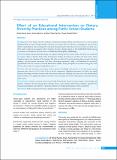Please use this identifier to cite or link to this item:
https://hdl.handle.net/20.500.14356/1095Full metadata record
| DC Field | Value | Language |
|---|---|---|
| dc.contributor.author | Aryal, Binod Kumar | - |
| dc.contributor.author | Mahotra, Anita | - |
| dc.contributor.author | Pachya, Ambika Thapa | - |
| dc.contributor.author | Pahari, Durga Prasad | - |
| dc.date.accessioned | 2023-04-23T11:03:45Z | - |
| dc.date.available | 2023-04-23T11:03:45Z | - |
| dc.date.issued | 2021 | - |
| dc.identifier.citation | AryalB. K., MahotraA., Thapa PachyaA., & PahariD. P. (2021). Effect of an Educational Intervention on Dietary Diversity Practices among Public School Students . Journal of Nepal Health Research Council, 19(2), 239-245. https://doi.org/10.33314/jnhrc.v19i2.2255 | en_US |
| dc.identifier.issn | Print ISSN: 1727-5482; Online ISSN: 1999-6217 | - |
| dc.identifier.uri | http://103.69.126.140:8080/handle/20.500.14356/1095 | - |
| dc.description | Original Article | en_US |
| dc.description.abstract | Abstract Background: Poor dietary diversity leading to malnutrition among children and adolescents is a serious public health problem in Nepal. Though nutrition education intervention has been effective in changing the dietary intake habits of individuals in school settings, the contextual educational intervention has not been tested in our study area. This study is aimed at assessing the effect of dietary diversity education based on the Health Belief Model among secondary level students in selected schools of Siddhicharan Municipality, Okhaldhunga. Methods: Quasi-experimental study design was employed during the intervention study. Our study was conducted in 3 phases: Phase I, Baseline Study; Phase II, Education Package Development; and Phase III- Intervention Study (Implementation and evaluation of the package). The data was collected for getting baseline that was used to develop package, pre-intervention assessment and after intervention assessment, using a self-administered structured questionnaire based on constructs of Health Belief Model (HBM). Study participants were students from grade 7 and 8. The collected data was analyzed using SPSS version 21. Results: After the education intervention, dietary diversity knowledge and practice in the intervention group increased from 16.4% to 54.2% and 32.8% to 48.6% respectively. Significant association (P<0.001) was noted between knowledge of dietary diversity with intervention in post-test. Similarly, the mean score of the Health Belief Model construct was significantly improved and showed an association (P<0.001) with nutrition education after the intervention. Conclusions: Nutrition education based on the Health Belief Model showed a positive impact on knowledge and practice of dietary diversity among school students. Hence, such education intervention should be promoted by educational institutions, the Ministry of Education, Ministry of Health and Population, NGOs and INGOs. Keywords: Adolescent; dietary diversity; education intervention; health belief model school | en_US |
| dc.language.iso | en | en_US |
| dc.publisher | Nepal Health Research Council | en_US |
| dc.relation.ispartofseries | Apr-June, 2021;2255 | - |
| dc.subject | Adolescent | en_US |
| dc.subject | dietary diversity | en_US |
| dc.subject | education intervention | en_US |
| dc.subject | health belief model school | en_US |
| dc.title | Effect of an Educational Intervention on Dietary Diversity Practices among Public School Students | en_US |
| dc.type | Journal Article | en_US |
| local.journal.category | Original Article | - |
| Appears in Collections: | Vol. 19 No. 2 (2021): Vol 19 No 2 Issue 51 Apr-Jun 2021 | |
Files in This Item:
| File | Description | Size | Format | |
|---|---|---|---|---|
| 2255-Manuscript-23757-1-10-20210907.pdf | Fulltext Download | 276.51 kB | Adobe PDF |  View/Open |
Items in DSpace are protected by copyright, with all rights reserved, unless otherwise indicated.
